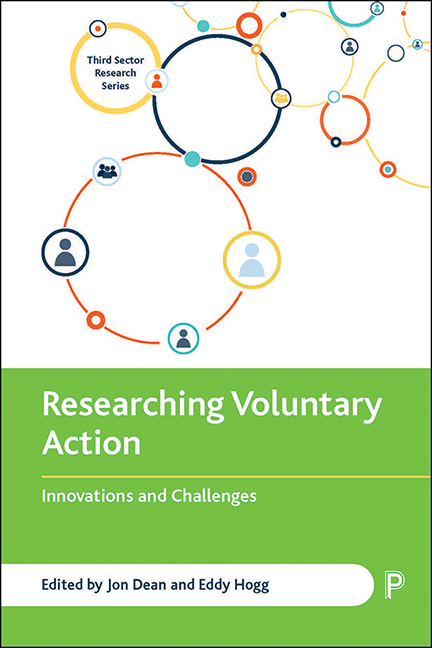Book contents
- Frontmatter
- Contents
- List of figures, tables and boxes
- Notes on contributors
- Acknowledgements
- Series editor’s foreword
- 1 Introduction
- 2 (Un)suitable methods and reflexive considerations: an interview and focus group study of youth volunteering
- 3 Interpretive ethnography: a UK charity shop case study
- 4 Collaborative philanthropy and doing practically relevant, critical research
- 5 Peer research: co-producing research within the context of voluntary and community action
- 6 Charity advertising: visual methods, images and elicitation
- 7 Using archives and objects in voluntary action research
- 8 Using Mass Observation as a source of qualitative secondary data for interdisciplinary longitudinal research on voluntary action
- 9 Investigating meanings and messages on volunteering through television media
- 10 Annual reporting in voluntary organisations: opportunities for content analysis research
- 11 Researching risk in the voluntary sector: the challenges and opportunities of regulatory data
- 12 Exploring the benefits of volunteering: combining survey and administrative data in the Nordic ‘laboratory’
- 13 Spatial approaches to the voluntary sector
- 14 Restudies, surveys and what counts as volunteering
- 15 Conclusion
- References
- Index
7 - Using archives and objects in voluntary action research
Published online by Cambridge University Press: 15 September 2022
- Frontmatter
- Contents
- List of figures, tables and boxes
- Notes on contributors
- Acknowledgements
- Series editor’s foreword
- 1 Introduction
- 2 (Un)suitable methods and reflexive considerations: an interview and focus group study of youth volunteering
- 3 Interpretive ethnography: a UK charity shop case study
- 4 Collaborative philanthropy and doing practically relevant, critical research
- 5 Peer research: co-producing research within the context of voluntary and community action
- 6 Charity advertising: visual methods, images and elicitation
- 7 Using archives and objects in voluntary action research
- 8 Using Mass Observation as a source of qualitative secondary data for interdisciplinary longitudinal research on voluntary action
- 9 Investigating meanings and messages on volunteering through television media
- 10 Annual reporting in voluntary organisations: opportunities for content analysis research
- 11 Researching risk in the voluntary sector: the challenges and opportunities of regulatory data
- 12 Exploring the benefits of volunteering: combining survey and administrative data in the Nordic ‘laboratory’
- 13 Spatial approaches to the voluntary sector
- 14 Restudies, surveys and what counts as volunteering
- 15 Conclusion
- References
- Index
Summary
Introduction
The archives, records and material culture of voluntary organisations are vital assets. They can play an essential role in helping researchers to understand the roles of voluntary organisations in society, as well as remaining important sources of institutional identity, corporate memory and accountability for charities themselves. Archival research enables greater awareness of the significance of voluntary action to society in the UK and elsewhere. We can't fully understand modern societies, and, in the case of this chapter specifically, modern Britain, without acknowledging the ongoing part played by the charities and non-governmental organisations (NGOs) that helped to forge the public health, education and social care systems, form cultural, leisure and sporting lives and shape relations with the wider world. Voluntary organisations’ archives are particularly valuable because they often contain the histories of marginalised and vulnerable individuals or communities whose lives may not have been recorded elsewhere or whose voices may go unheard.
The history of voluntary action, humanitarianism and philanthropy is now a flourishing field of scholarship, and there is an encouraging trend for researchers outside the discipline of history to turn to archival evidence when researching voluntary action, including in geography, social policy and sociology, media and cultural studies and international development. Indeed, archives are not solely about ‘things already past’ but will capture stories ‘of the present and the future’ (TNA, 2017: 8). The International Council on Archives (2004: 8) describes the preservation of NGO and charity archives as a ‘public service designed to meet the known and unknown needs’ of people today and in the future. Less scholarly attention has been paid to the source base that underpins this research, although studies have focused on the vulnerability of in-house charity archive services (Newton, 2004; McMurray, 2014); the challenges of records management in charities (Dawson et al, 2004); cataloguing and user engagement (Mills, 2013a); and third-party deposit of archives (Oppenheimer, 2020). This chapter draws on my experience of research using voluntary organisations’ records and material culture across several historical and interdisciplinary research projects (see Brewis, 2014; Gotz et al, 2020; Brewis et al, 2021a).
- Type
- Chapter
- Information
- Researching Voluntary ActionInnovations and Challenges, pp. 70 - 83Publisher: Bristol University PressPrint publication year: 2022



